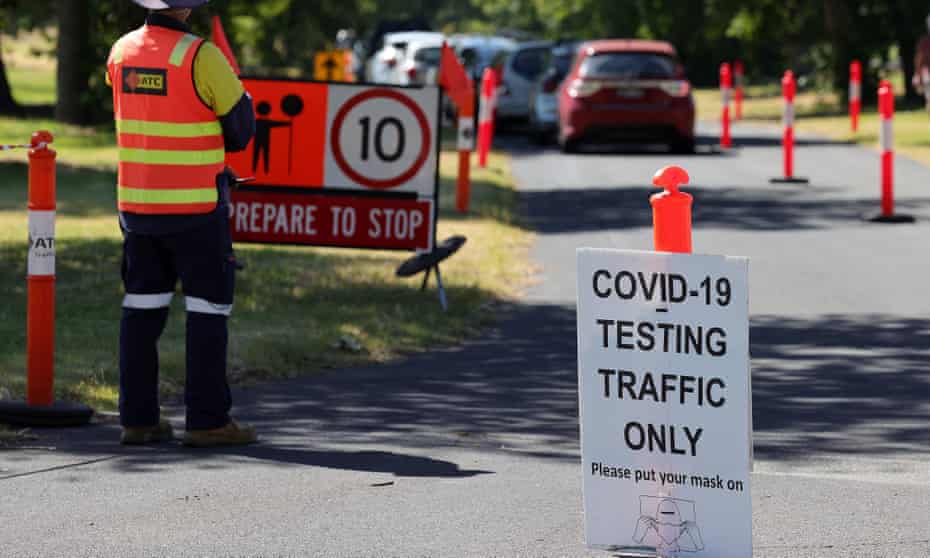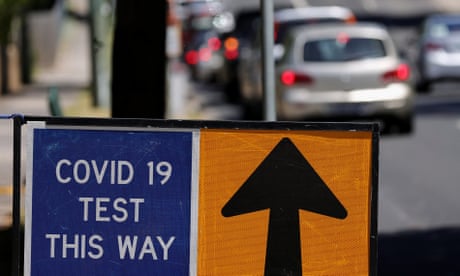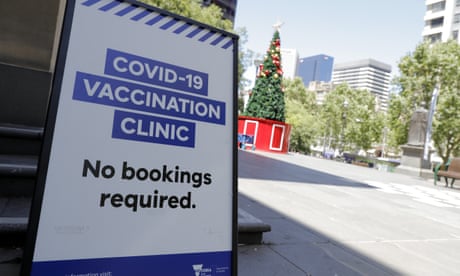Extract from The Guardian
Sheer scale of cases means the impact on an already fatigued health system ‘could be enormous’, report says.
- The OzSage report: 10 key points from its critique of Australia’s Covid response
- Follow our Covid live blog for the latest updates
- RATs: kits double in price amid gouging accusations
- Daily Covid cases could rise to 100,000 within weeks, expert predicts
- Vaccine rollout tracker; cases and data tracker

In a report released on Thursday, OzSage said the trajectory of Covid data suggested hospital admission and intensive care unit occupancy numbers were “on a steeply rising trend and anticipated to exceed earlier peaks quite soon. In other words, optimistic assumptions about the impact of the Omicron variant on hospital admissions are unrealistic.”
The report said “a fatalistic approach will be fatal for some people”, with NSW in the frontline.
“The ‘let it rip’ strategy and defeatist narrative that ‘we are all going to get it’ ignores the stark lived reality of the vulnerable of our society,” the report said. “Despite three doses of vaccine, some patients with cancer and other immunosuppressed people, have substantially reduced protection against Omicron,” it said, noting that about half of the adult population had co-existing health conditions.

On Wednesday the NSW health minister, Brad Hazzard, repeated his statement initially made on Boxing Day that “we’re all going to get” Covid as a result of the Omicron variant.
The OzSage authors, who include the University of NSW’s Prof Raina MacIntyre, criticised the rhetoric from leaders such as the NSW premier, Dominic Perrottet, who have argued that the media and others should no longer focus on the raw daily case numbers, because hospitalisation rates are so much lower than during the Delta wave when many fewer people were vaccinated.
“Daily case numbers are now 10 times higher than during the Delta wave and may be 100 times higher in January” the OzSage report notes.
“Even if hospitalisation rates are lower with Omicron compared to Delta, a halving of hospitalisation rates with a 10-fold or 100-fold increase in cases will still translate to a high burden on the health system,” it said. “This is likely to overwhelm the health system, with regional services at particular risk.”
The report also blasted “quick-fix adjustments” such as discouraging people from seeking Covid tests if they don’t feel symptoms, to reduce pressure on what remains of the test and trace system.
The result would be an increased burden on the health system, the report said, “because it will result in chains of transmission that could otherwise have been stopped”.
“We are disturbed by the repeated messaging that only symptomatic people should get tested, when 40-45% of transmissions are asymptomatic, and even in people who develop symptoms, the peak of infectiousness is in the two days before symptoms begin,” OzSage said.
“The false reassurance of the messaging will result in more cases of viral transmission that otherwise would have been prevented.”
On Thursday NSW reported a fresh record number of daily cases of 12,226, or about one in eight of the 97,201 tested. Hospitalisation numbers also jumped by about one-fifth to 746 in the state, although those in ICU edged up only marginally.
Victoria also reported a sizeable jump in new cases, rising about one-third in a day to 5,137. The state also registered 13 deaths.
Australia could reach 100,000 daily cases within weeks, Michael Lydeamore, a Monash University modeller, said on Wednesday.

While Omicron infections appear to be 40-45% less likely to result in hospitalisations of those inflected, the sheer scale of the cases along with a health system already fatigued from almost two years of battling Covid meant the impact of the current wave “could be enormous”, the OzSage report said.
“The rapid rise in Omicron cases may mean we are only days away from seeing higher hospitalisation and ICU admissions than during the peak of Delta,” the group said.
As wards reached capacity and more people contracted Covid without getting access to hospital care, more people might die in their homes, OzSage said.
“One week ago, NSW Health advised people under 50 years to care for themselves at home, without access to Hospital in The Home,” it said. “This week, they have revised the age cut off to anyone under 65 years. This is the ultimate in ‘personal responsibility’.
“The consequence of this policy is that people may die at home when their lives could have been saved by proper timely healthcare,” it said, noting that during the Delta wave, the mean age of those dying at home from Covid was about 40.
“During any other time, this would have been a national scandal, but it passed without comment or scrutiny from policy makers and health authorities,” it said.
The report does not directly criticise the federal government, but Scott Morrison has repeatedly stressed management of the pandemic in the latest phase is becoming a matter of “personal responsibility” rather than restrictions imposed by governments.
No comments:
Post a Comment